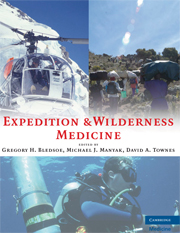Book contents
- Frontmatter
- Contents
- Contributors
- Foreword
- Preface
- Acknowledgments
- PART I EXPEDITION PLANNING
- 1 The Expedition Physician
- 2 Assessing Expedition Medical Needs
- 3 Expedition Medical Kit
- 4 Immunizations
- 5 Legal Considerations during Expedition Planning
- 6 Travel Safety
- 7 Nutritional Support for Expeditions
- 8 Water Treatment
- 9 Special Considerations
- 10 Communications Planning for the Expedition Medical Officer
- 11 Minimizing Risk on an Expedition
- 12 The Expedition Returns
- PART II EXPEDITIONS IN UNIQUE ENVIRONMENTS
- PART III ILLNESS AND INJURIES ON EXPEDITIONS
- APPENDIX The Expedition Medical Kit
- Index
11 - Minimizing Risk on an Expedition
from PART I - EXPEDITION PLANNING
Published online by Cambridge University Press: 05 March 2013
- Frontmatter
- Contents
- Contributors
- Foreword
- Preface
- Acknowledgments
- PART I EXPEDITION PLANNING
- 1 The Expedition Physician
- 2 Assessing Expedition Medical Needs
- 3 Expedition Medical Kit
- 4 Immunizations
- 5 Legal Considerations during Expedition Planning
- 6 Travel Safety
- 7 Nutritional Support for Expeditions
- 8 Water Treatment
- 9 Special Considerations
- 10 Communications Planning for the Expedition Medical Officer
- 11 Minimizing Risk on an Expedition
- 12 The Expedition Returns
- PART II EXPEDITIONS IN UNIQUE ENVIRONMENTS
- PART III ILLNESS AND INJURIES ON EXPEDITIONS
- APPENDIX The Expedition Medical Kit
- Index
Summary
INTRODUCTION
You are making flight arrangements for that special trip: an exotic locale, an adventure tour, or a scientific expedition. The immediate excitement has been tempered by sobering thoughts of health and safety. You have searched the Internet for travel advisory information about your developing world destination. The travel agent may have been to the area but probably stayed in a nice hotel in the capital city, not in the tent or hammock you will call a temporary home. You have been advised to sign up for travel insurance. You are inundated with confusing choices about insurance, and there is very generic advice about the site – drink only bottled water, get immunization for hepatitis and meningitis, have a tetanus shot within the last 10 years, eat only well-cooked food. Your local physician has little experience with travel medicine. Information about local health resources is nonexistent or unreliable. Geopolitical information resources say the area is reasonably stable, but there has been sporadic violent insurgent activity in the northern regions for years, and travel is advised with caution. Bird flu has been reported in the adjacent country. What should you do to prepare for your travel safety?
RISK ASSESSMENT AND INSURANCE
International travel, once a daunting proposition reserved for those with significant financial means, has now become commonplace with approximately 50 million annual travelers from industrialized countries to the developing world.
- Type
- Chapter
- Information
- Expedition and Wilderness Medicine , pp. 144 - 151Publisher: Cambridge University PressPrint publication year: 2008



